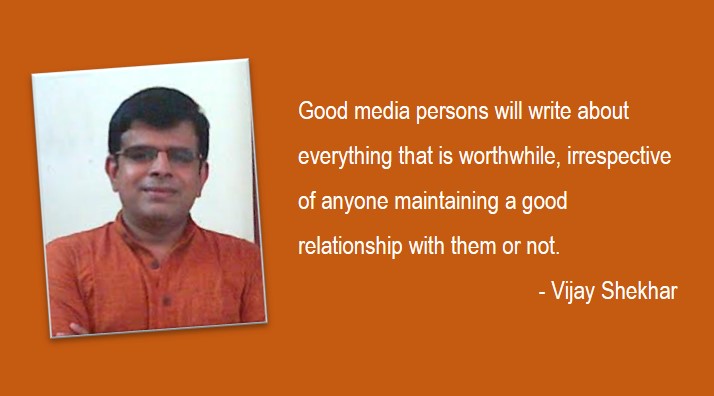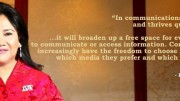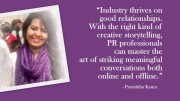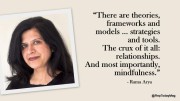‘Excellent media relations’ is an oft boasted about phrase among PR professionals. Many put it in their resumes as one of their key strengths or even their core strength. Even during new business development pitches, proactively or reactively, consultancy professionals tend to brag about having people with exceptional media relations…the ones who can get ‘anything done in the media’.
Yes it may be possible to get anything done in the media…but this does not happen because of these self-proclaimed media relations mavericks, but because of the general nature of the media and/or mediapersons.
Like in every profession, there are good and bad people in the media too.
The Good Media
Good mediapersons will do a good story for themselves and the media houses they work for. They truly feel that the story will do good to a cause and is worth carrying. They will not do it for any ‘consideration’ over and above the remuneration that they get from their respective workplaces. They will not do it because they know someone (who can be positively impacted) very well. They will do the story irrespective of any consultancy personnel knowing them well, just knowing them or not knowing them at all. It’s another thing that a consultancy’s ‘media relations’ personnel will take credit for a good client story by such media citing her/his excellent relationship with the mediaperson. But fact of the matter remains that ‘media relations’ does not work with this kind of media.
As consultancy personnel, by all means we should know such media, and also wish them on New Year, Diwali, Christmas, and on their birthdays and anniversaries…not because we want something in return in the name of ‘media relations’, but because they are good human beings.
Where it’s all about ‘something extra’
Having said that, ‘media relations’ also does not work with bad media. Bad mediapersons will never do a story just because they know someone really well. Media relations with these kind of media works more on a tangible ‘give and take’ basis. They expect something more than what their respective media houses pay them as salaries. With them, only the ‘extra consideration’ works, and not mere ‘relations’.
A senior communications professional once bragged to me about how he got an excellent coverage done for his client in one of the key media by arranging for the mediaperson to travel to Germany (of course at the client’s cost). It was a trip where all costs were taken care of…right from the pick-up from the journalist’s residence to the drop back. On another occasion, this same professional had got the same mediaperson to visit the same client’s local facility…this visit did not result in any coverage. Clearly it was the ‘Germany pampering’ that did the trick for that big coverage…so where does ‘media relations’ come in between? Would that journalist have refused the Germany trip had he been approached by another consultancy personnel with whom he didn’t have much of a relationship?
Over the past 10 years or so, I have interviewed several young PR professionals. Most of them mention ‘Media Relations’ as their key strength on their resumes. And during the interview, they are all very good at dropping names…‘I know her/him really well’ types. Just a few days after the resource is hired, s/he comes up with requests for gift vouchers, complimentaries etc. for the media. And they actually ‘teach’ their superiors as to how important these courtesies have become nowadays for maintaining good relationships with the media.
The case against ‘media relations’
So why does a consultancy need these so called ‘media relations’ resources? Is it that the (bad) media will accept gift vouchers and complimentaries only from them because of their so called ‘good relationships’? Will they not accept such courtesies from someone who has a lesser or no relationship with them?
In a nutshell, good media will write something worthwhile, irrespective of anyone maintaining or not maintaining a good relationship with them. Similarly, if the bad media get their ‘extra bit’ (irrespective of who hands it over to them), they too will write, inspite of or despite ‘media relations’.
I rest my case.
The views expressed here are that of the author and do not necessarily reflect that of Reputation Today.







Be the first to comment on "There is no such thing as Media Relations"